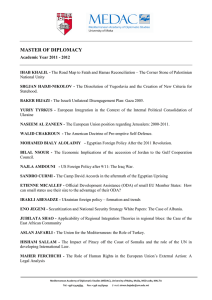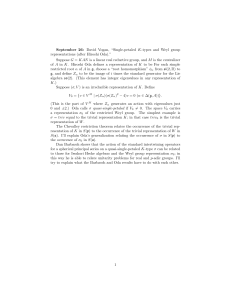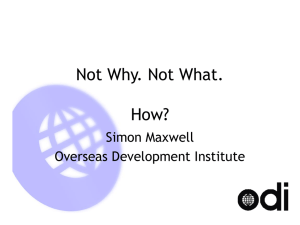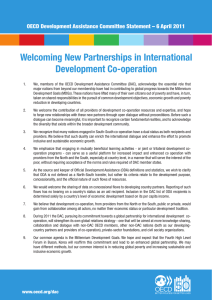Official Development Assistance (ODA) guidance
advertisement
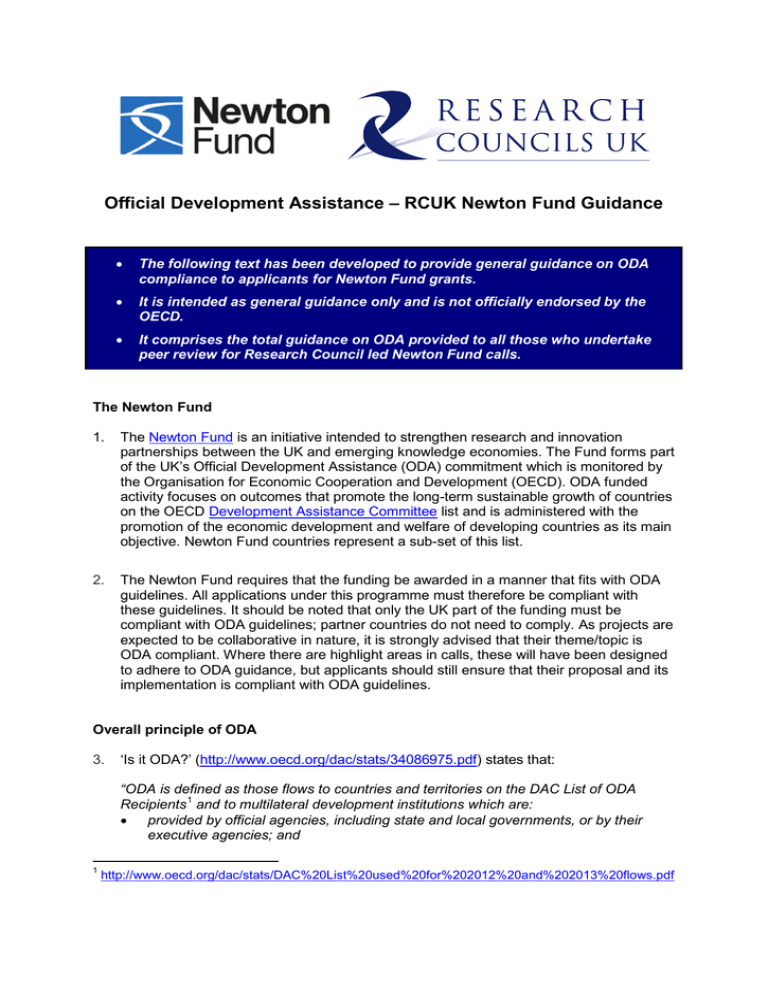
Official Development Assistance – RCUK Newton Fund Guidance • The following text has been developed to provide general guidance on ODA compliance to applicants for Newton Fund grants. • It is intended as general guidance only and is not officially endorsed by the OECD. • It comprises the total guidance on ODA provided to all those who undertake peer review for Research Council led Newton Fund calls. The Newton Fund 1. The Newton Fund is an initiative intended to strengthen research and innovation partnerships between the UK and emerging knowledge economies. The Fund forms part of the UK’s Official Development Assistance (ODA) commitment which is monitored by the Organisation for Economic Cooperation and Development (OECD). ODA funded activity focuses on outcomes that promote the long-term sustainable growth of countries on the OECD Development Assistance Committee list and is administered with the promotion of the economic development and welfare of developing countries as its main objective. Newton Fund countries represent a sub-set of this list. 2. The Newton Fund requires that the funding be awarded in a manner that fits with ODA guidelines. All applications under this programme must therefore be compliant with these guidelines. It should be noted that only the UK part of the funding must be compliant with ODA guidelines; partner countries do not need to comply. As projects are expected to be collaborative in nature, it is strongly advised that their theme/topic is ODA compliant. Where there are highlight areas in calls, these will have been designed to adhere to ODA guidance, but applicants should still ensure that their proposal and its implementation is compliant with ODA guidelines. Overall principle of ODA 3. ‘Is it ODA?’ (http://www.oecd.org/dac/stats/34086975.pdf) states that: “ODA is defined as those flows to countries and territories on the DAC List of ODA Recipients 1 and to multilateral development institutions which are: • provided by official agencies, including state and local governments, or by their executive agencies; and 1 http://www.oecd.org/dac/stats/DAC%20List%20used%20for%202012%20and%202013%20flows.pdf • 4. each transaction of which: a) is administered with the promotion of the economic development and welfare of developing countries as its main objective; and b) is concessional in character and conveys a grant element of at least 25% (discounted at a rate of 10%).” All Newton Fund awards made by the Research Councils automatically comply with (b). Applicants and reviewers need to concentrate on ensuring that (a) is met by the proposal they are writing or reviewing. ODA compliant research activities 5. The OECD defines ODA compliant research activities as follows: “Research includes financing by the official sector, whether in the donor country or elsewhere, of research into the problems of developing countries. This may be either (i) undertaken by an agency or institution whose main purpose is to promote the economic growth or welfare of developing countries, or (ii) commissioned or approved, and financed or part-financed, by an official body from a general purpose institution with the specific aim of promoting the economic growth or welfare of developing countries. Research undertaken as part of the formulation of aid programmes in central or local government departments or aid agencies is considered as an administrative cost.” (DAC Statistical Reporting Directives, http://www.oecd.org/dac/stats/38429349.pdf, 51.iv) 6. Some other categories of activity similar to potential Newton Fund activities are counted as ODA: “Development-oriented social and cultural programmes provide basic facilities or training to enhance the social and cultural development of nationals of developing countries… As well as educational services, they will typically…include finance for the provision of books, periodicals, the creation or operation of libraries, provision of prizes, and the running of seminars, philosophy and humanistic studies, the consolidation of a recipient country’s cultural heritage (including archaeological projects)…” (DAC Statistical Reporting Directives, http://www.oecd.org/dac/stats/38429349.pdf, 51.iv) Key ODA compliance issues to note in writing and reviewing applications for funding 7. Any Newton Fund project must make it clear that its primary purpose is to promote the economic development and welfare of the partner country. Applicants should consider how their project will: • address poverty and development issues; • address the issue identified effectively and efficiently; • use the strengths of the UK to address the issue; • demonstrate that the research component is of an internationally excellent standard. 8. Any benefit to the UK has to be the secondary consideration and should not lead to a project being funded if it doesn't primarily deliver the development objective. 9. Applications will be assessed by a competitive peer review process with ODA eligibility being a gateway criterion for approval. UK peer reviewers will be provided with this guidance and where necessary administrative desk checks will also be undertaken to identify projects that are or are not ODA compliant. General points to consider in writing and reviewing applications for funding (These are provided as additional guidance only, and as a list of potential considerations in assessing ODA compliance are not exhaustive.) 10. The fund can support research and innovation capacity building to address the development issues in two ways: at a country level, increasing the skills and knowledge base and supporting the development of the research infrastructure; and at a sector specific level in areas that the partner country has identified as being important for welfare enhancement and economic growth. 11. Capacity building should be aimed at improving partner countries’ ability to undertake and disseminate research in order to maximise its impact on the issues of poverty and their economic growth. Activity in this area can cover pure and applied science and be multi-disciplinary in nature. For example, up-skilling in mathematics, physics, chemistry, astronomy, agricultural sciences, ICT, engineering, environmental sciences, leadership and management etc. 12. The partner country must be able to demonstrate existing or potential ability to grow industry (or other relevant sector) with the capacity to make use of the research, and there should be a clear route into supporting key economic sectors, or addressing development and poverty challenges in the partner country. 13. Projects would not be acceptable if the focus was on commercialisation of research outside of the partner country, or where the ownership of the resulting IP is to pass to partners outside of the partner country, unless there was a clear plan to build new businesses/business growth in the partner country as part of a collaboration with international partners and within a wider global market strategy 14. Projects would not be acceptable if the focus was on small numbers of SMEs that are randomly selected, are in sectors primarily of interest to the donor country, or not in high priority sectors for the partner country where the expectation would be that they would have only a marginal impact on the partner country’s economic growth. 15. Engaging with enterprises can be included in ODA where the outcome is clearly primarily with a development outcome. The aim should be to identify solutions that are more than just a single product within a market but ones that address broad market failures or key systemic challenges that exist.

